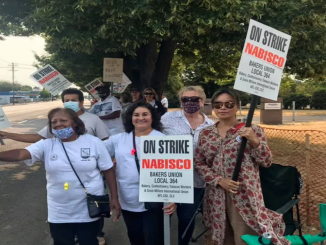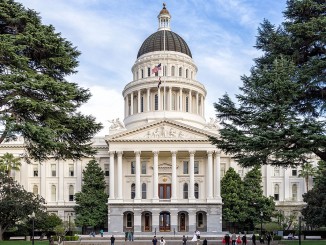
When ABC took Jimmy Kimmel off the air after he criticized the response of the right-wing to Charlie Kirk’s killing, the implication was clear. A powerful corporation owned by Disney was silencing a host after pressure from a Trump-appointed FCC regulator. Then, just days later, after a public outcry and reports of people canceling Disney+ subscriptions, Kimmel was back.
But this quick reversal wasn’t a victory for free speech. It was a reminder of how big business really operates. The whole episode – the quick suspension and quick return – shows a simple truth: when push comes to shove, corporations have no principles, only an interest in profit.
To understand why this matters for every working person, we need to look at history.
A Pattern of Collaboration
We are often told that democracy and so-called free enterprise go hand in hand. But history shows that when authoritarian movements rise, the capitalist class rarely stands in their way. In fact, they often lend a hand.
Look at Germany in the 1930s. Facing economic crisis and a left-wing workers’ movements, giant companies like IG Farben and Krupp didn’t defend democracy. They saw Hitler’s Nazi party as a useful tool to crush unions and communists. They funded his rise, believing he would provide “order” and protect their property. Once he took power, these companies happily profited from rearmament and even used labor from concentration camps. Even corporations that didn’t initially support the Nazis fell in line either soon before or as soon as they took power. Their choice wasn’t based on ideology, but on a cold calculation: a dictatorship that guaranteed their profits was better than a democracy with a strong working class.
The complicity was not limited to German industrial giants. The American corporation IBM provided the Nazi regime with advanced technology that was used to organize the logistics of the Holocaust. IBM’s systems helped calculate train schedules and manage the identification of victims, making the genocide more efficient. For IBM’s executives, the gains from this relationship outweighed any moral concerns, proving that the pursuit of profit can lead corporations to become direct enablers of genocide.
We don’t even have to look to Nazi Germany to see this pattern. In the 1950s, during the Second Red Scare, the US government targeted anyone suspected of leftist ideas. What was the response of major corporations like the studios in Hollywood? They didn’t defend their employees’ right to free speech. They created blacklists and fired writers, directors, and actors for their political beliefs. They collaborated with the purge to avoid being labeled “anti-American” and to discipline their workforce. The goal was the same as in Germany: stability, control and profits achieved by siding with the powerful.
Kimmel and the Corporate Knee-Jerk Reaction
The initial reaction to the Kimmel controversy followed this historical pattern perfectly.
When FCC Chairman Brendan Carr, a political appointee, publicly threatened ABC and Disney, the corporate response was immediate. Sinclair and Nexstar, two major station owners who control ABC affiliates across the country, pulled Kimmel’s show. Then ABC quickly suspended him.
This was the classic corporate reaction to authoritarian pressure. For Nexstar, which needed the government’s sign-off on a multi-billion-dollar merger, silencing a host was a simple business decision. The stifling of free speech was a cheap cost of doing business.
The pattern goes beyond Kimmel. Stephen Colbert’s Late Show was abruptly cancelled under questionable financial pretexts, after years of drawing Trump’s indignation.
The Reversal
So why did Kimmel come back so fast? Did Disney suddenly find its conscience?
No. The reversal was the product of a different kind of pressure. There was a significant public backlash, and crucially, reports began to surface of viewers canceling their Disney+ subscriptions. While unknown but large numbers cancelled their subscriptions, Disney’s stock took a sharp downwards turn, and the cost of censorship (bad publicity leading to lost revenue) probably started to outweigh the cost of angering the government.
This proves the point rather than contradicting it. Corporations are driven by calculation, not conviction. They bowed to state pressure first, then bowed to market pressure second. Their principle is profit. They have no commitment to free speech; they only care about which course of action protects their bottom line.
No Salvation in the Boardroom
The two-week saga of Jimmy Kimmel’s suspension is a tiny symptom of a much larger disease. It teaches us a vital lesson: we cannot rely on CEOs or corporate boards to defend our rights.
Whether it’s free speech on television or the right to organize a union, these things are obstacles to corporate management when they threaten stability or profit. As we saw in Germany and during the Red Scare, the instinct of the rich is to side with the strongman who promises “order” over the workers who fight for their needs or for justice.
The defense of our rights will never be secure if it depends on the calculations of executives at Disney or Sinclair. Lasting protection can only be built one way: through the organized power of working people, acting independently in our own interests.




